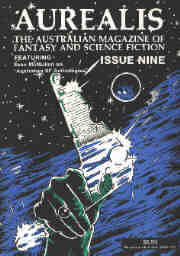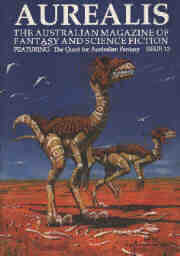Aurealis #138
$3.99
Aurealis #138 has all of the new fiction, non fiction and art you could want. Fresh new stories from around the world accompanied by provocative articles, great reviews and superlative artwork.
- From the Cloud — Stephen Higgins
- Doing the Right Thing — Maddison Stoff
- Next Door to Gallipoli — David Harris
- Like We Practiced — Joanne Rixon
From the Cloud
Stephen Higgins
In the last ‘From the Cloud’ I mentioned the artwork that appears in Aurealis. We feel that the art that accompanies the stories in Aurealis adds a lot to the story. The visual arts side of genre publishing has always held an important place in the industry. One only has to look at the art shows that are a feature of any WorldCon to see the role that art plays in science fiction, fantasy and horror publishing.
Less obvious is the influence of science fictional and fantasy themes in music. This is a subject close to my own heart. I listen to a lot of music with strong science fiction influences. Those of you familiar with the term ‘Space Rock’ will no doubt have heard of bands like ‘Hawkwind’, early Pink Floyd and Gong. Similarly, Progressive Rock reflects the musician’s interests in science fiction as well as fantasy. Many ‘Prog rock’ albums from the 70s were homages to major fantasy and science fiction novels. Indeed, a quick glance at a list of progressive rock acts reveals the strong links between fantasy and the progressive rock genre. The Lord of the Rings alone provided the inspiration for many rock outfits of the seventies.
There is, of course, an ongoing debate about what makes a science fiction novel, science fiction? What qualities place a novel into that particular genre? And the same thought has occurred to me regarding music. An example: Tubular Bells by Mike Oldfield is generally regarded as a classic ‘progressive’ rock album. It is mostly instrumental, has some interesting time signatures and uses some little-known instruments. And, of course, it is comprised of two long pieces of music, even though those two long pieces are simply a patchwork of shorter pieces. Anyway, a classic of the genre. Some years later Mike Oldfield decided to release an album called Tubular Bells II… (he has also released Tubular Bells III, Tubular Beats, Tubular Bells 2003 and the Millennium Bell but I digress…). Tubular Bells II is related to its predecessor in many ways. It is mostly instrumental, has a range of unusual instrumentation and has distinct sections making up the whole. But many regard it as a ‘New Age’ album, rather than a progressive rock album. I can see where these people are coming from. You know that music you hear when you enter a crystal shop that sells dream catchers and bits of quartz? That is New Age music. It is odd that this album should be consigned to one genre when its predecessor is assigned to another. What is the difference? Often it is hard to tell. If an album has a woman ululating to a vaguely Celtic sounding melody you can bet that it is New Age music. Tubular Bells II has that woman. Tubular Bells (the original) does not. There is also a sort of cheesy production to the whole thing, and it is all very slick and smooth.
So how can we apply this to the science fiction genre? People who do not read science fiction but who do write it, often claim their work is not genre-based simply because it does not have aliens and flying saucers. The fact that the work contains tropes and themes that are definitely science fictional seems to be ignored. I was discussing the very, very excellent ‘Fargo’ series with my co-editors. It is a quirky comedy drama and each series is set in a different time with different characters. Anyway, in one show, during a shootout, a flying saucer dramatically appears. It is not pre-empted in any way. It does not really impact the plot, and it is never mentioned again. So, how much of the flying saucer do we need to have to push ‘Fargo’ from ‘comedy/drama to science fiction? How much Celtic wailing moves music from progressive to New Age? The definition of science fiction has been a topic for debate for ages and I am beginning to think that the genre is experiencing some bracket creep lately. With the success of science fictional and fantasy-based TV shows, the genre is beginning to acquire a critical acceptance (though grudgingly to some) that is seeing it broaden its base. One result of this is the fracturing of the genre into many sub genres. Just as Space Rock music devolved into Post Punk, and shoegaze, fantasy and science fiction titles are now being re-badged as alternate histories, space opera, science fictional police procedural etc etc. And I daresay there is some cheese and ululating women in there as well.
All the best from the cloud!
Stephen Higgins
From Doing the Right Thing by Maddison Stoff:
Your eyes open to pulsing lights and screaming klaxons. You gasp as she wrenches you from your cocoon. Uterine fluid gushes out around you then fades into the plush carpeted floor.
‘Come on,’ she says. ‘Come on…’
Her eyes are wild and shine like diamonds. The shadows play across her face as you hear a guttural murmur that sounds like words but not in any language you can understand. You shake your head, then slap it.
‘Stupid,’ you hear yourself say, ‘stop.’
‘Hurry!’ she yells, with real fear in her eyes. ‘The monsters come. They come!’
You allow yourself to be pulled along, from your bedroom to the empty visualiser-corridors, the emergency lights shifting into veins along the walls. A woman from security is lying in the middle of the hallway, a stasis rifle in her hands and blood pooling around her neck. Your new friend holds a scalpel, and it glitters in the dark. Suddenly you find that you mistrust her.
From Next Door to Gallipoli by David Harris:
He followed the last of his memories to the Woolpack Hotel on the corner of George and Marsden.
It was not the place he remembered.
But just outside, in a courtyard as sterile as the refurbished bar inside, was a single, small table which sat beside a brick wall. Unplastered and untouched. A vestige of yesteryear that carried within it the soul of the original establishment.
The wall remembered.
And so, he sat at the table with a pint of beer before him and shared the last of his memories with that wall. Apple bobs and Irish singalongs and bare-knuckle boxing matches. It remembered as well as he the night in 1896 when Bill Stubbs had caught a greased-up pig to rapturous applause.
The pint of beer remained untouched; the fading light captured within it like a trench lantern at night. Beads of condensation ran down the glass and the head flattened over time as patrons moved around him, oblivious. He knew he was out of place, but the wall had no interest in bemoaning such things. A pub was a pub. All it knew was camaraderie and mateship and that was okay with him, all things considered.
As the light outside the pint glass fell away it held reflections in its gently glowing surface, and he caught a glimpse of himself. The high collar of his jacket service dress pinned down with rising sun badges made from oxidised copper. The service cap with the leather chin strap. The lieutenant’s insignia on his right sleeve and the parade quality moustache. He almost recognised himself.
From Like We Practiced by Joanne Rixon:
The first thing Loyalty heard was a low, almost sub-sonic groan. It started slow, a rumbling in the decking and walls, but over a handful of seconds it rose in volume, shaking the whole care module like an earthquake. Loyalty had felt earthquakes before, when she was very little and still lived planetside with her grandparent Nneki. Outside, under the wide sky, Nneki would wrap his arm around her shoulders and wait it out, feet braced against the dirt.
Maybe that was why she froze now, arms curled around her baby, Oteng: wait out the tremor and you’ll be fine, her instincts said. But the rules were different in space, and the sound didn’t stop. It moaned and rolled, and the module jerked and shook. The sound became the sound of breaking things, important things, not just the light bulbs in the ceiling that popped and sparked. Loyalty was sure she could hear the bending of the struts and bridges that linked the care module to the other modules that made up the whole space station Saranyu. Even the giant, kilometres-broad petals that radiated out from the station and aimed heat and light around the atmosphere were screaming, the strain vibrating through everything.
The alarms weren’t going off. No voices from the Office to tell her what to do.
Loyalty met Betta’s eyes across the room. The other girl looked as terrified as Loyalty felt, and Loyalty’s heart thumped. She flattened her palm against Oteng’s back, pressing him against her cleavage. The sound had woken him, and he screamed up at her from the carrier strapped to her front. All fourteen children sitting in small groups on the floor among the toys and books were panicking, clinging to the floor and crying.





